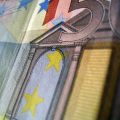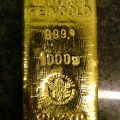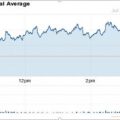What Are Dow Jones Futures? How To Invest In Futures
What Are Dow Jones Futures?
Futures are derivative instruments, which means that their value derives from the value of another financial instrument. In this case, the value of a Dow Jones Future contract derives from the value of The Dow Jones Industrial Average Index. In very simple words, a future contract is a negotiated deal between a buyer and a seller, on an exact day in the future. The buyer agrees to buy the contracted amount at a predetermined price and the seller agrees to sell under these conditions. So a Dow Jones Future is a standardized contract in which the two sides agree today to make a future deal, for a certain amount of lots at a defined price. In most cases, the future deal ends up with no physical delivery of the contracted goods to be made. You can deliver to me 5 Dow 30 indexes for example. This is why, after the futures contract expires, the buyer receives/pays just the difference between the predicted future price and the actual price when the contract expires. And this is not only how Dow Jones futures work, but also almost all futures contracts work the same way.
Example of future contracts in action:
Today’s price of the Dow 30 index is $17 000. You bet that the price after 6 months will be $17 500, so you decide to take advantage of this gain. You find a seller named Jane and she thinks that the price of the index will be $16 500 after 6 months. You both decide to make a contract in which you buy 1 futures contract from Jane and she sells this one future contract to you at the current price of the index of $17 000. You are both obliged to close the deal after 6 months, which means making the opposite operation at the market price – you sell your contract to Jana and she buys it back from you at the price of the market when your contract expires. If the price of the index goes up after this period of time and reaches $17500, you will make a profit because you can sell your contract at this price and earn $500. Jane is obliged to pay you that price and she will lose $500. But if the price of the index falls to $16 500, you will lose $500, because Jane will pay you only this price. She will earn $500 in this case:
The future contract was bought by you and sold by Jane at $17 000.
1. After 6 months the price is $17 500
*, in this case, Jane is obliged to pay you $17 500 which is $500 more than your initial investment of $17 000. You make a profit and Jane makes a loss of $500.
2. After 6 months the price is $16 500
*, in this case, Jane is obliged to pay you only $16 500, which is $500 less than your initial investment of $17 000. You make a loss and Jane makes a profit of $500.
This all means that to make a futures contract, you first have to find someone who thinks the opposite. If you expect a price increase, you need to find someone who thinks the price will drop and vice versa. You alone can not make a future contract. Futures are usually traded on regulated exchanges and they do the job of finding the seller/buyer for you. So, you don’t need Jane from the example, you just need a trading account with a broker, who offers futures contracts trading.
Forward Contracts (Forwards)
Forward contracts are something similar to future contracts, but they are not standardized and they are not exchange-traded, they are personal contracts. For example, Dow Jones futures are traded always at 10 times the price of the index and are traded on The Chicago Board of Trade. To learn more about these contracts, check our article here:
Why Do We Need These Futures?
As you might know, the Dow Jones Industrial Average is a stock index, and it’s not possible for anyone to invest in it directly. Many investors want to put their money in the index, and futures are one of the most convenient ways to do this. Dow Jones Futures (DJ) are traded on The Chicago Board of Trade, where the value of one contract is 10 times the value of The Dow – if the Dow trades at 17 000, one contract would be 170 000 $. This could be a lot of money for some people, but most brokers offer leverage. This means, that if someone wants to buy a contract, he/she could do it with 10 times less money for example. The rest are provided by the broker as a temporary loan to you. There are also mini Dow Jones future contracts (YM), their value is 5 times the value of the DJIA index.
Using leverage futures, you can have your money invested in one of the most followed and important indexes in the world. For example, to buy a standard Mini Dow Jones Futures contract, you need approximately half of the current price of the index. This could be a risky operation, though. The move with one point of the price of the contract will equal a 5$ change in the profit/loss of the position. So a 100-point move in a certain direction could be $500, or a 10% change in the position. Very often there are even bigger daily moves of the Dow Jones index which could cause bigger losses if they are against you.
Some more things to know about futures contracts trading
Futures contracts are typically used to hedge against or speculate on price movements of various commodities, such as grains or oil, but can also be used for currencies and indexes. Trading in futures contracts allows you to take advantage of price discrepancies in various markets in order to make a profit and is generally considered a higher risk-reward venture when compared to a more traditional investment strategy.
When trading in futures contracts, there are a few things to keep in mind. First, it’s important to understand the leverage involved. Because futures contracts are inherently leveraged investments, it is possible to amplify both gains and losses when compared to traditional investments, so it is important to exercise caution. As a result, it is critical to understand the risks associated with your chosen position before entering a trade.
An additional factor to consider is the cost involved. While many brokers waive transaction fees on futures contracts, additional charges such as maintenance and margin fees are usually required to maintain positions. On top of this, you also have to take into consideration the liquidity of the underlying asset. Assets with low liquidity can lead to a lot of price swings and cause you to be on the wrong side of the trade should the price move against your position.
Finally, it is important to understand the legal and regulatory requirements associated with trading in futures contracts. Many brokers now require clients to be accredited investors in order to access certain futures contracts, and there are oftentimes restrictions on the size of the position one can take. Understanding the complexities of futures trading is essential to becoming a successful trader, so it is important to do your research before getting started.
Despite the added risk, investing in futures contracts can be an excellent way to diversify your investments and possibly earn higher returns if done properly. With an understanding of the risks and regulations associated with futures trading, and the willingness to allocate the necessary capital, you can find yourself in a great position to make potentially meaningful gains with this strategy.
Did you like the article, please, consider sharing it with friends? You can do this with just a click on a button. Thanks!







